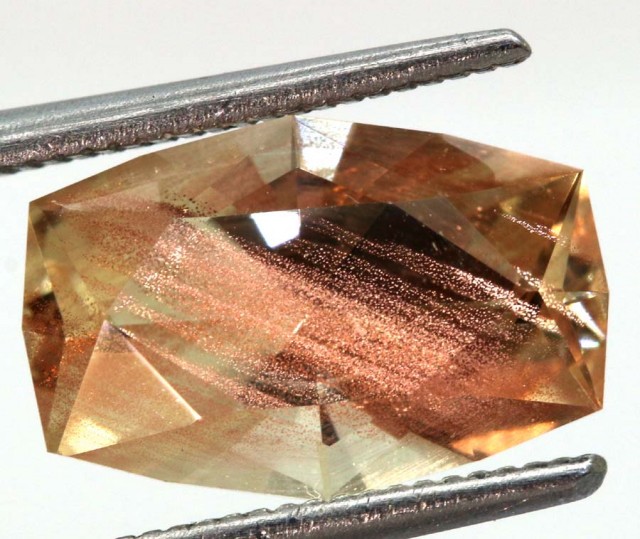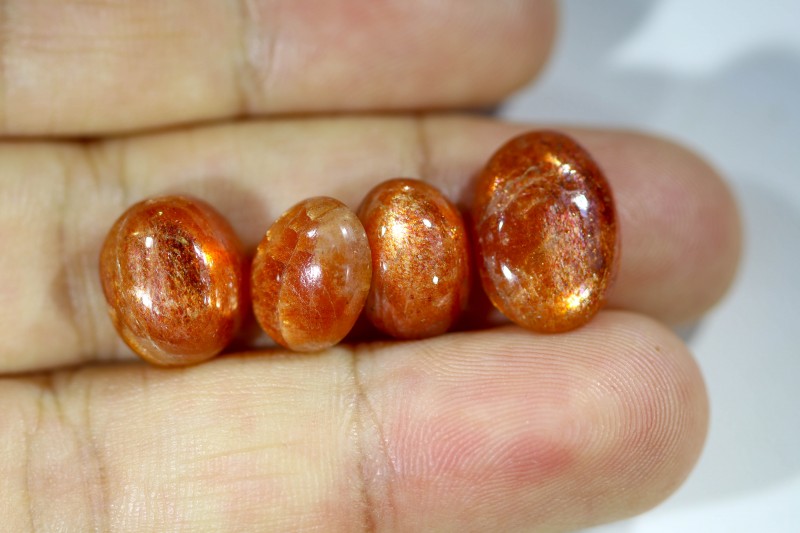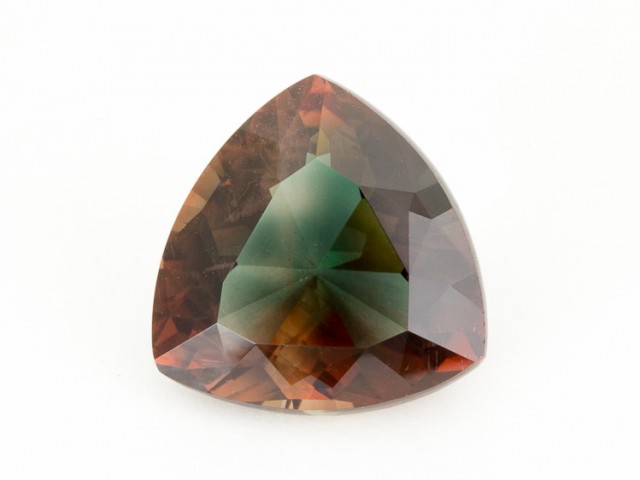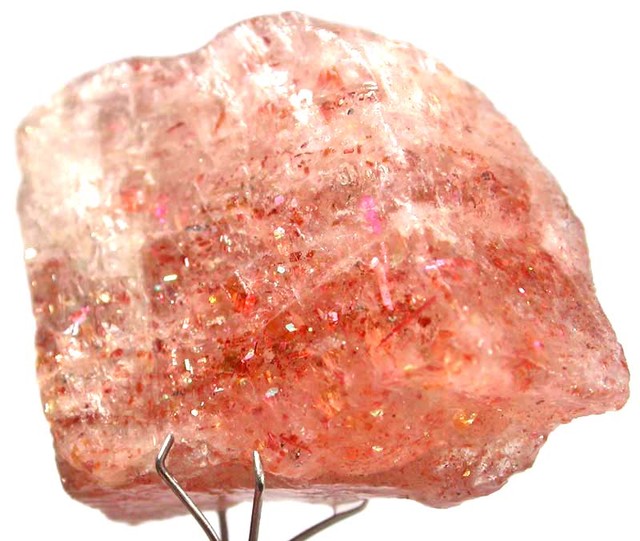
Sunstone Gemstone: Meaning, Properties, Uses & More
 True to its name, sunstone is an exuberant reddish-orange gemstone that’s widely regarded as a powerful, energetic source of light and life on Earth. Sounds cool, doesn’t it? But what is it about this warm-hued gem that illuminates such interest? Sunstone has been a fundamental crystal used in holistic healing practices and jewelry making for centuries.
True to its name, sunstone is an exuberant reddish-orange gemstone that’s widely regarded as a powerful, energetic source of light and life on Earth. Sounds cool, doesn’t it? But what is it about this warm-hued gem that illuminates such interest? Sunstone has been a fundamental crystal used in holistic healing practices and jewelry making for centuries.
If you’re wondering why it’s called “sun stone,” we’ll need to inform you about aventurescence — an optical illusion occurring when a person looks at a sunstone gemstone. A less scientific name describing this phenomenon would be “metallic glitter.” Yep, that’s right, sunstones look like they have a bunch of glitter specks shining under the stone’s surface! As you can easily imagine, this captivating effect that shines gloriously in jewelry!
Why does it happen? Aventurescence occurs when light enters the stone and reflects off the tiny, flat mineral inclusions that sit at an almost parallel orientation. When light enters the stone and reflects off these inclusions, it produces a flash of light that glitters from certain angles. Thus, you see the amazing metallic glitter of sunstone! Have you ever seen a satellite photo of the sun? If so, you might understand why sunstone has such a close resemblance.
Of course, there is more than meets the eye with this radiant gemstone. Keep reading as we explore the qualities that give sunstone its namesake, meanings, and prevalence today.
About Sunstone
Sunstone is no newcomer to the gemstone market, as it has been a feature accentuating both ancient and modern civilizations with bright jewelry and artifacts. The stone itself is usually reddish-orange in color, but there are other types of sunstone that resemble another type of flame, mixing both green and orange into a single stone.
If your birthday falls in July or August, you have the benefit of the bright and happy sunstone as your secondary birthstone. Is your zodiac sign Libra? Then sunstone is your ruling planet!
For those interested in geology, sunstone is a plagioclase feldspar composed of aluminosilicates of sodium and sometimes calcium. Each sunstone first formed in lava before being sprayed out, where it remained covered for some time. Sunstone ranks on the Mohs hardness scale between a 6 and a 6.5, though some argue it can be as high as a 7.2.
Either way, sunstone is a dependable and stable gemstone with medium hardness.
The aventurescence – otherwise known as a spangled appearance – seen in sunstone is actually the presence of another mineral inside the stone. Any guesses as to which one? Typically, that additional mineral is either hematite, goethite, or pyrite, and in very rare instances it can also be copper.
Gemologists identify sunstone gemstones by several features, which we’ll outline next.

Sunstone Specifications and Characteristics
While most sunstone is reddish-orange and mostly translucent, the gemstone comes in a variety of colors and hues.
Color: Colorless, yellow, red, green, blue, and copper schiller
Crystal structure: Triclinic
Luster: Vitreous
Transparency: Translucent or transparent
Refractive index: 1.525–1.58
Density: 2.62 to 2.65
Cleavage: 001
With the gem details covered, what can we glean from the various sunstone meanings? If you have an inkling they’re related to that fiery star in the sky — you’re on the right track!
Sunstone Meaning
The sunstone crystal meaning is fairly consistent with literary and spiritual symbols for the sun. When you think of the sun, what comes to mind? If abundance, joy, warmth, and light spark in your imagination, then you can apply that same association to sunstone! Overall, sunstone is the epitome of light, positivity, and happiness.
Not surprising, considering those Vitamin D-filled sun rays instill us with a sense of joy and hope.
A look at ancient society will enlighten us as to sunstone’s presence in religious symbolism. The Egyptians used sunstone as a symbol for Ra, the sun god, and creator god. Archaeologists have identified sculptures and other artifacts of Ra that contain the sunstone crystal.
In Greek mythology, sunstone immortalized Helios, the Greek personification and god of the sun. They even believed that Helios gifted sunstone to humans as a representation of his power.
In other interpretations of sunstone meanings and symbolism, the stone encapsulates divine masculine energy, making it the antithesis to moonstone, a stone of divine feminine energy. Think “Father Son” and “Mother Moon!” Not a bad set of parents, right?
Another powerful symbol associated with sunstone is the rising phoenix, a mythical bird that bursts into flames at death to be reborn from its own ashes. Many magicians believe that sunstone can bestow magical powers to anyone whose hand touches the stone.
Pretty powerful! What is sunstone used for in holistic and spiritual healing?

Sunstone Healing Properties
Sunstone is an influential component of holistic healing, and that’s been the case since the dawn of early civilization. Nordic Vikings first used sunstone as a compass, believing it would guide them through Arctic waters in the direction of habitable land. Native Americans use sunstone to heal injured warriors, and Native Canadian tribes harnessed the stone in medicine wheel healing ceremonies.
Today, holistic healers and crystal practitioners use sunstone to help wearers find their life’s true purpose, while concurrently cutting ties with people and things that weigh them down. Need help enforcing boundaries to your loved ones or coworkers? Wearing a sunstone crystal can give you the power to say no so that you can devote your energy toward facets of your life that align with your goals and purpose.
Sunstone properties can relieve you of depressive thoughts and gloominess. With this joyful gemstone in hand, you’ll draw yourself out of isolation by increasing self-esteem and self-reliance. The stone promotes hope when you struggle to find it, showing you the light at the end of the tunnel.
Wearers can harness the power of the sun and receive sunstone metaphysical properties toward pursuits they should devote energy toward. Much like a shining star, sunstone’s ability to provide abundance and joy is wonderful, and forge a greater connection to the spiritual realm.
On a physical level, some people use sunstone to treat rheumatism, as well as foot and back problems.
Whether you use sunstone for holistic purposes or stylish jewelry, let’s acquaint you with the important buying properties of this happy gemstone.
Sunstone Gemstone Properties
When evaluating gemstones, we look for qualities such as cut, color, clarity, and carat weight. Collectively, these are called the 4Cs, and each plays an important role in the valuation and quality of a given gemstone.
Color
What color is sunstone? Sunstones come in a range of colors that encapsulate the sun’s red, orange, and yellow rays. It’s the copper platelets within the gem composition that give sunstones their warm-hued colors that can even appear pinkish. Some rare sunstone varieties appear in deep green and blue tones. But sunstone color varies from stone to stone and each gemstone has gradients.
For instance, one side of the tone can appear more peach or pink-hued while the other is darker orange or red. When it comes to sunstone value, color plays the largest role, alongside transparency and aventurescence. The highest valued sunstones are bright red, bicolored, or green.

Cut
Cutting sunstone requires a skilled eye to best display the aventurescence. If cut poorly, the stone will not exhibit the full optical effect. Thus, gem cutters must analyze each individual stone before proceeding with the best cut.
Sunstones can be cut in two different ways: faceted or cabochon style. Faceted gemstones are cut into popular shapes like round brilliant, oval, and pear. When sunstones exhibit an optical feature like aventurescence, smoothing and polishing them into a cabochon gem will best display the optics and unique features.
The cabochon style is most conducive for allowing light to glow across the dome-shaped gemstone, thanks to the copper platelets. Some varieties of sunstone are transparent, such as Oregon sunstone, and these make striking faceted gemstones.
What about clarity?
Clarity
When a sunstone is cut cabochon style, clarity isn’t as important because the stone isn’t very translucent. However, the clarity of a sunstone depends on the presence of inclusions.
In many cases, inclusions can diminish a stone’s value, but not sunstone!
Inclusions are what cause the aventurescence effect, so they can actually add value. The plate-shaped inclusions inside sunstones are highly reflective, allowing them to produce a magnificent flash under incandescent light. So, beauty truly is in the eye of the beholder, because when you hold that flash in your hand, it’s a radiant feature!
Carat Weight
Most sunstones are fairly small, weighing up to one carat. Of course, there are larger stones in the market, but because sunstones are overall an affordable gemstone, carat weight doesn’t play as large a role in value or desirability, especially compared to precious gemstones like diamonds or emeralds.

Sunstone History
Where does sunstone come from? The earliest recorded discovery of sunstone was in the Fjord region of Norway. Vikings came across the glistening gem and wrote about its usage in early texts. Outside of Norway, sunstone was used and revered around the world.
Sunstone’s association with the sun in many cultures also led to its connection with an almighty God. Many civilizations viewed sunstone as coming from a divine creator, which amplified the stone’s value. However, over time, the value of sunstone dropped relative to precious and semi-precious stones. While the stone is still used in jewelry and healing today, religious and spiritual usage has declined.
However, sunstone jewelry remains ever-popular, which beckons the question: where is sunstone formed?
Stone Origins and Sources
Sunstone comes from a few different places worldwide, including Sweden, Tanzania, Southern Norway, South Australia, and Oregon, USA. The sunstone found in each of these places is fairly similar in composition and spangled appearance with one exception – the Oregon sunstone.
Oregon sunstone gained fame as the rarest of all types of sunstone, including the newest addition to the market: black sunstone. The Oregon variety is the only known type of sunstone that contains copper inclusions, rather than hematite or pyrite. As a result, these sunstones can reflect a variety of different colors from water-blue to yellow and to various shades of green, red, and pink.
If you’re able to get your hands on a gorgeous Oregon Sunstone, you’ll want to take good care to keep it in top shape.

Sunstone Care and Maintenance
Like most other crystals, sunstone should be washed only with warm soapy water. Use nothing harsher than a soft-bristled toothbrush for scrubbing, and take care to set your jewelry properly to avoid chips, cracks, and scratches to the gemstone.
If you’re using your gemstone for healing purposes, you’ll want to charge sunstone to reset the stone’s healing energies and vibrations. Some stones, like amethyst and moonstone, must be charged at night under the light of a full moon. That being said, can you guess how to cleanse sunstones? Under direct sunlight of course! Lay your sunstones out in the sun from time to time, allowing the sun’s exuberant energy field to nourish and recharge your stones.
Sunstone Prices
As we mentioned before, sunstone value truly hinges on the color and sprangled appearance of the gemstone. For this reason alone, Oregon sunstone will likely retain the highest value and price. At the same time, most of the world’s sunstone will sell for anywhere between $2 per carat to $50 per carat.
The largest sunstone known to date, the “Spectrum Sunset,” weighs a whopping 81.25 carats! How’s that for a handful of sunshine? Are you ready to grab your own sun rays?
Invite Sunshine Into Your Life with Sunstone!
Sunstone is a joyful gemstone filled with uplifting energies. When you look at a sunstone, you can’t help but smile at the happy radiance and optical flash. If you’re looking to invite more brightness into your life, look no further than the happy sunstone. With sunstones, you’ll harness the power of the sun and let the good vibes shine!
Search the Gemstone Encyclopedia
Related Auctions
Related Articles
Originally the Birthstones or gemstones were associated with a zodiac sign or the month of a individuals birth. Find out what your stone is and view the stones we have for sale
8th Feb 2021
There are dozens of quartz and chalcedony gems with various colors and patterns. Learn all about quartz properties and every type of quartz, from amethyst and agate to plasma and phantom quartz!
15th Oct 2020
Hackmanite is a pink to violet sodalite gem known for its unique color-change and luminescence. Learn why hackmanite is special, from its rare qualities to the types of hackmanite jewelry available.
28th Mar 2018
Latest Articles
Tantalite is a group of red, brown, or black minerals containing the rare and valuable element tantalum. Discover the uses, history, prices, and properties of tantalite gemstones in this guide!
11th Nov 2024
Hodgkinsonite is a very rare collector’s gemstone known for its vibrant pink or purple hues, only found in New Jersey, USA. Learn hodgkinsonite’s prices, history, properties, and traits in this guide!
9th Jun 2024
Canasite is a rare mineral usually found as greenish-yellow inclusions in charoite but also known as a purple gemstone. Learn canasite’s history, varieties, properties, and prices in this guide.
27th May 2024
Article Categories
How To's is where you will find helpful articles from gem Rock Auctions on how to cut gemstones, select gemstones and buy gemstones.
9 Articles





